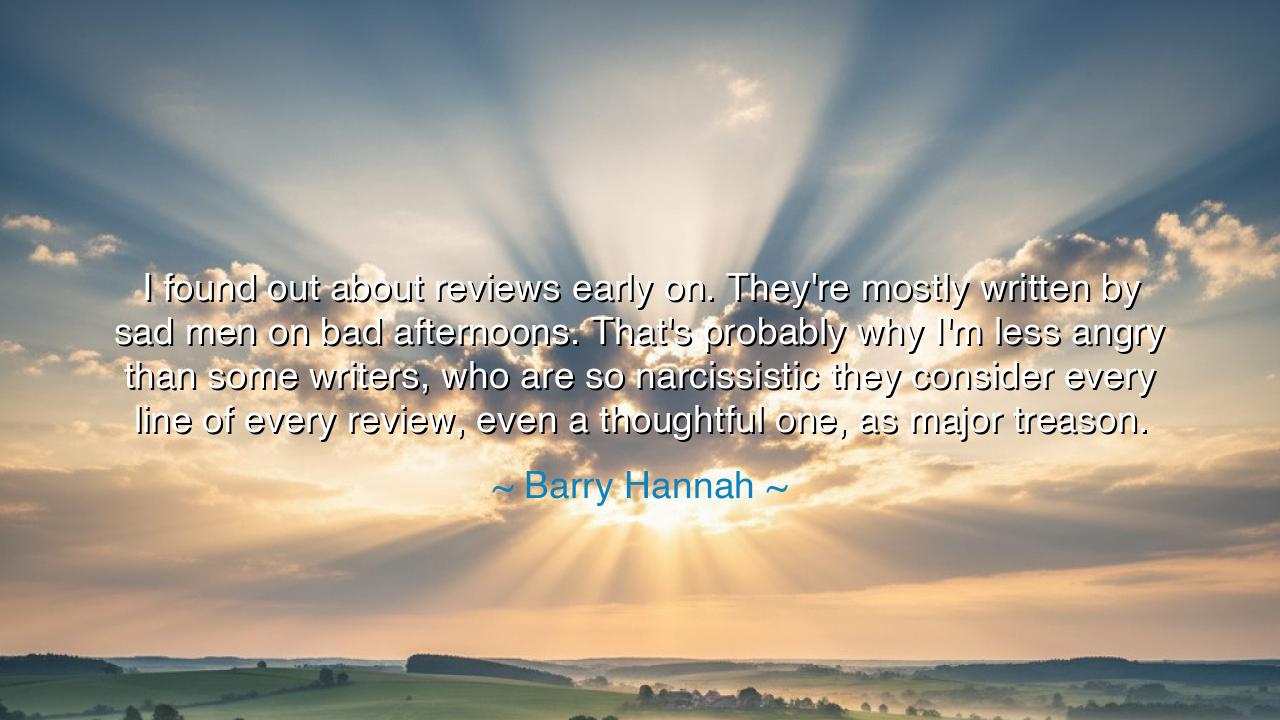
I found out about reviews early on. They're mostly written by sad
I found out about reviews early on. They're mostly written by sad men on bad afternoons. That's probably why I'm less angry than some writers, who are so narcissistic they consider every line of every review, even a thoughtful one, as major treason.






Barry Hannah, the fierce and lyrical voice of the American South, once wrote with the raw honesty that marked all his work: “I found out about reviews early on. They're mostly written by sad men on bad afternoons. That's probably why I'm less angry than some writers, who are so narcissistic they consider every line of every review, even a thoughtful one, as major treason.” Within this seemingly sardonic reflection lies the spirit of a man who had come to understand the frailty of both creator and critic. His words, though laced with humor, contain the wisdom of endurance—the hard-won calm of one who has wrestled with pride and learned to live beyond its wounds.
The ancients would have called Hannah’s insight a lesson in ataraxia—the art of inner peace amid chaos. He had seen what many artists never learn: that to seek validation from others is to build one’s soul upon shifting sand. The critic, he suggests, is not an oracle of truth, but a mirror fogged by his own mood, his own failures, his own weary afternoon. To be judged by such a mirror is to risk distortion. Hannah’s “sad men on bad afternoons” are not villains, but symbols—of the world’s imperfect attempts to measure genius, of the countless small minds that try to weigh beauty with a blunt scale.
His tone is not scornful, but compassionate, even ironic. For Hannah knew that bitterness corrodes the artist faster than failure. Many of his peers, as he observed, turned anger into obsession, nursing every bad review as if it were a mortal wound. He calls them “narcissistic,” not to mock, but to warn: when the writer becomes too attached to his reflection, he forgets his calling. The true artist serves the work, not the echo of applause. Hannah, who had endured both acclaim and obscurity, understood that greatness cannot bloom in the soil of vanity. To care too much about being praised is to betray the art itself.
In his words we hear the echo of an older wisdom, the wisdom of Marcus Aurelius, the philosopher-king who wrote in his Meditations: “If you are disturbed by external things, it is not they that trouble you, but your own judgment of them.” The review, like any worldly opinion, has no power except the power we grant it. To react with rage is to surrender mastery of the self. Hannah, like the Stoics of old, found strength in detachment—not indifference, but the discipline to let judgment pass without taking root in the heart. He understood that the writer’s task is not to please, but to reveal; not to perform, but to endure.
There is also, hidden in his jest, a mercy toward the critic. “Sad men on bad afternoons” reminds us that all who judge are human, and their judgments, like the weather, shift with the hour. A reviewer’s cruelty may spring not from malice, but from exhaustion or envy; a reviewer’s praise may rise not from insight, but from mood. The wise artist recognizes this and forgives it. Just as a sailor does not curse the sea for every storm, so the artist must not curse the critic for being human. The sea is vast, the storm brief—and so is the opinion of others in the life of a creator.
History gives us countless examples of this truth. Vincent van Gogh, uncelebrated and mocked in his time, painted through hunger and rejection. Critics called his art “madness,” and yet, long after their ink had dried, his colors continue to speak with the light of eternity. Had van Gogh allowed himself to be broken by their words, the world would have lost the sunflowers, the stars, and the aching beauty of his vision. Greatness endures because it listens to the soul, not the critics.
Thus, Barry Hannah’s teaching, though wrapped in wit, is an act of liberation. He urges every creator to free themselves from the tyranny of opinion, to write, paint, sing, or build not for praise, but for truth. For reviews will fade, critics will die, but art, if born from honesty, will live beyond them all. The sad men on bad afternoons will always write—but the wise will read their words with a smile, and return to their work unchanged.
So let this wisdom stand for all who create: do not measure your worth by the applause or condemnation of others. Be steadfast as the mountain, serene as the sea, and true as the flame that burns unseen. For the only review that matters is the one written by time itself—and time, though slow, is the fairest critic of all.






AAdministratorAdministrator
Welcome, honored guests. Please leave a comment, we will respond soon